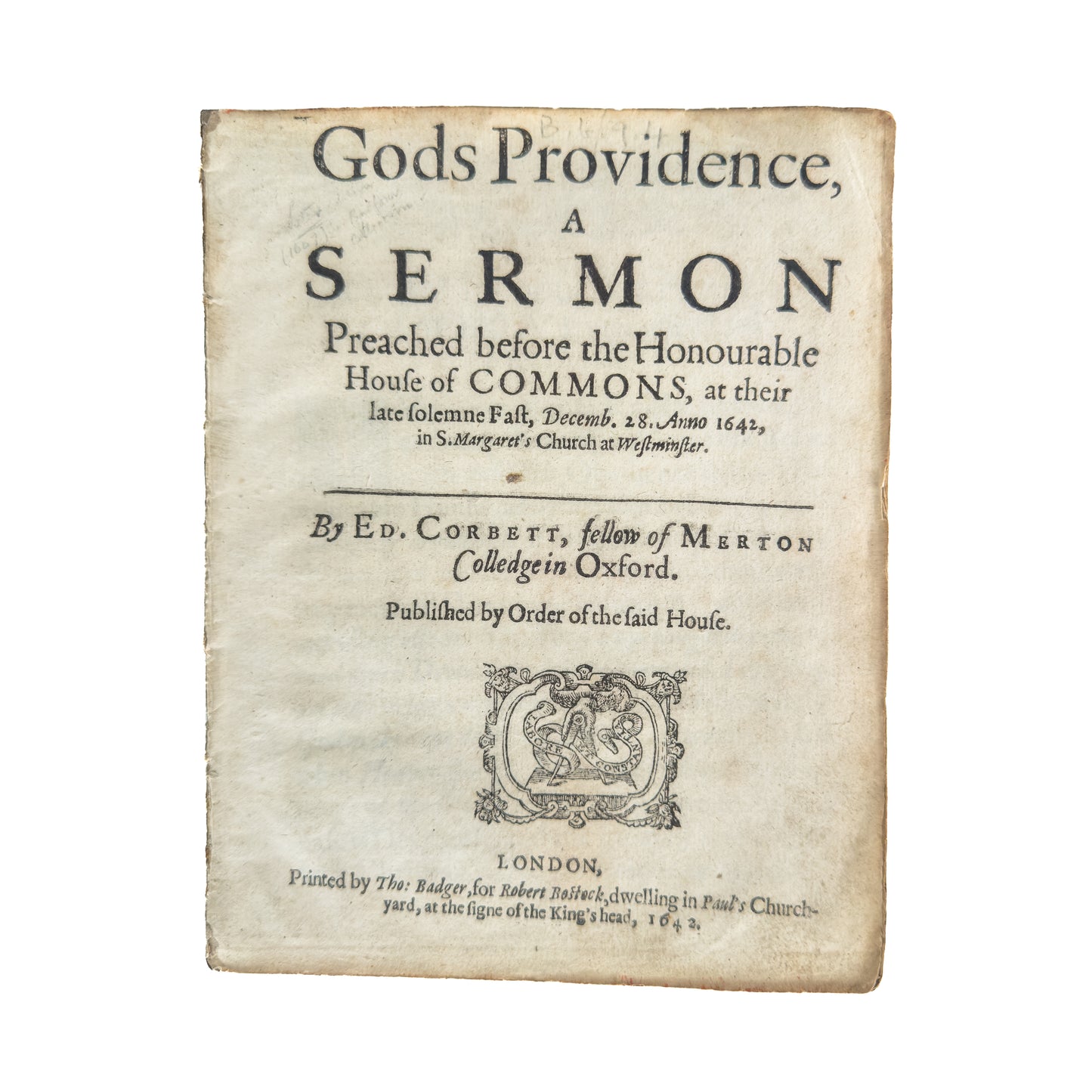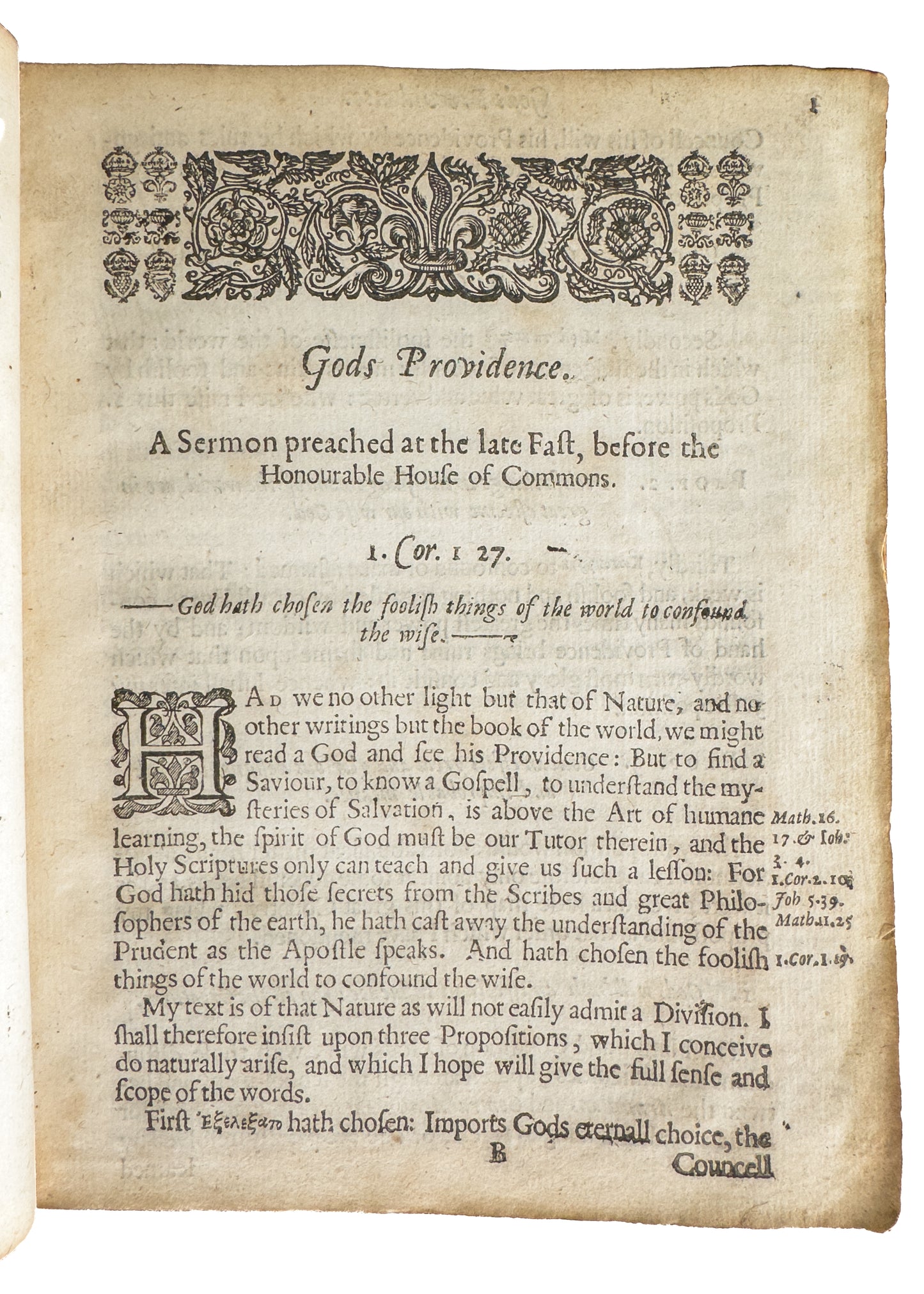Specs Fine Books
1642 EDWARD CORBETT. Westminster Assembly Puritan on God's Sovereignty at Outbreak of Civil War.
1642 EDWARD CORBETT. Westminster Assembly Puritan on God's Sovereignty at Outbreak of Civil War.
Couldn't load pickup availability
Rather rare and sensibly desperate sermon preached by Westminster Divine, Edward Corbett, during the opening months of the English Civil War. His distress is sensible and the sermon reads almost as a meditation and prayer, uttered we imagine through tears, at the state of the England, Ireland, Scotland, and Wales.
But he ends hopefully:
It was a pious speech of Luther in an Epistle to Melancton, God is able to preserve his own cause form falling, or to raise it when it is fallen. God is never more near his people than when deliverance seems furthest off. They can be in no condition where he is at a stand and cannot help them. This war which, we think, will devour us all, may be an Instrument of preservation as the whale which swallowed up Jonas, was a means to bring him to the shore. The depths of mercy are beyond the depths of misery, and God hath his own ways of helping his Children, when all things else deny them help. . .
[But] say that our sins are many and our transgressions great, yet God's mercies are more; and his glory will be greater in pardoning. No faults, can dam up the endless goodness of the Almighty, we cannot offend so much as he can pardon. Say that our enemies are many, and mighty, and cruel, yet Ahab with a few young men vanquished Benhadad's great army and 32 kings with him. The Devil is stronger than man's wickedness than by his own power. Say what we can, and say the worst we can, that England is sore wounded, and poor Ireland is giving up the Ghost; Yet remember that Repentance preserv'd Nineveh which in 40 days was to be destroyed, that faith delivere'd Daniel out of the Lion's mouth. That he, who will raise our bodies, can mend our worst condition. Was Abraham deceived, who trusted in God for a son against the course of nature? Or David who being compassed about with the waters of affliction hoped for better times? Or the 3 children who believ'd that God would deliver them out of the fiery furnace?
O Lord my God in thee have I put my trust, save me from all that persecute me and deliver me. And deliver us all he will, if we all pray unto him; for faithful prayer is Omnipotent; and pray unto him we shall, if we all trust in him, for trust is the root and life of successful prayer; Let us all therefore pray, and trust, and trust, and pray, that our heavenly father would work a good understanding betwixt King Charles and his great Counsel, that he would look with the Eye of compassion upon dying Ireland, that his merciful hand would make up the breaches of distracted England, that his goodness would take away the cause of all calamities, our many, and great, and crying sins. And after our prayers let us trust again, that seeing it is all one with the Lord, to save with many or with few, to help with means or without means, He will in due time produce a sweet correspondence betwixt the King and People; He will deliver bleeding Ireland, out of the hands of blood Rebels. He will restore distressed England to a happy condition. He will pardon our iniquities, and remember them no more. Let us pray therefore, and trust continually, and let us never cease to trust and pray.
Corbett, Edward. Fellow of Merton Colledge in Oxford. Gods Providence, A Sermon Preached before the Honourable House of Commons, at their late Solemne Fast, Decemb. 28, Anno 1642, in S. Margaret's Church at Westminster. London. Printed by Tho: Badger, for Robert Bostock, dwelling in Paul's Church-yard, at the signe of the King's head. 1642. 30pp.
Good and textually complete; removed at some point from a larger sammelband, ut complete as issued, title through final page of text [p.30]. No half title. A bit handled, some marginal loss on final leaf. Usual associated weakness and flotsam to spine from sammelband.
Edward Corbet [1603 – 1658] was a prominent English puritan and member of the Westminster Assembly of Divines.
Early on he showed himself to be a scholar of substance and was apparently courted by Archbishop Laud to move theologically, but proved faithful to Puritan principles.
After years as a faithful Professor at Merton College at Oxford, he was selected as one of the Westminster Assembly of divines, and there preached the present, influential sermon before the Long Parliament for which he received the thanks of the house, and by an ordinance dated 17 May 1643 was instituted to the rectory of Chartham, Kent.
He held this living until 1646, when he returned to Oxford as one of the seven ministers appointed by the parliament to preach the loyalist scholars into obedience. He was also elected one of the parliamentary visitors of the university, but rarely sat among them. On 20 January 1648 he was installed public orator and canon of the second stall in Christ Church, Oxford, in the place of the ejected Henry Hammond; he resigned both places in August, possibly for reasons of conscience. The same year he proceeded D.D. on 12 April. At the beginning of 1649 he was presented, on the death of Dr. Thomas Soame, to the rectory of Great Hasely, near Oxford.
Share






